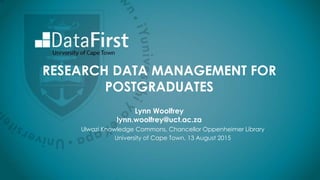
Data Management for Postgraduate students by Lynn Woolfrey
- 1. RESEARCH DATA MANAGEMENT FOR POSTGRADUATES Lynn Woolfrey lynn.woolfrey@uct.ac.za Ulwazi Knowledge Commons, Chancellor Oppenheimer Library University of Cape Town, 13 August 2015
- 2. Preparing Data for Re- use Data Collection and File Creation Depositing Data for re- use Data Analysis Project Start-Up Proposal Development & DM Planning “In the context of research …"Data Management" refers to the storage, access and preservation of data produced from a given investigation.”
- 3. Also called Research Data Curation
- 4. NEW REQUIREMENTS FROM FUNDERS AND UNIVERSITIES Research Data Management
- 5. From 2011 many research funders began requiring research data management plans in funding proposals.
- 6. In SA the National Research Foundation now requires Data Management for Sharing “[If Intellectual Property rights don’t apply] the data generated from this research must become available to other researchers working in the same field (National Research Foundation: Acceptance of grant conditions 2010).”
- 7. In line with Universities worldwide, UCT is creating policy that will require long-term preservation of UCT research output including data
- 8. WHY SHOULD WE DO IT? Research Data Management
- 9. Actually, where IS my data? What do they mean by RDM? Who are they to tell me what to do with my data? The university is just dreaming up more admin for me! To ensure research data is preserved and discoverable in the long-term
- 11. RDM Supports Better Research - Keeping accurate records of the research Process is sound research practice
- 12. RDM can prevent academic fraud Professor Diederick Stapel, at Tilburg University - Published 55 academic papers - Supervised 19 Ph.D. degrees based on his data - Faked all his data “Stapel’s fraud went undetected for so long because of “a general culture of careless, selective and uncritical handling of research and data” at the University Study Shows Meat Eaters are more Aggressive
- 13. RDM enables data re-use Research funders want to maximise returns on their investment in research by encouraging data re-use
- 14. WHO CAN HELP? Research Data Management
- 15. Data Services can take the RDM burden off researchers
- 16. At UCT DataFirst can help you prepare and share your research data
- 17. HOW TO WRITE A RESEARCH DATA MANAGEMENT PLAN Research Data Management
- 18. Data Management Planning elements • Data Type • Data Format (including size of data files) • Data description (metadata) standards used • Storage and backup • Security • Responsibility • Ownership and Intellectual Property rights • Data sharing
- 19. What type of data will you collect? Research Data is ….primary input into research and first order results of that research • “…Records documenting the research process (e.g. research protocols; applications for regulatory approvals and approvals granted) • Records documenting research outcomes or products (e.g. technical reports) • Records documenting the management of the research process/project(s)(e.g. applications for funding; contracts; purchase invoices; staff timesheets) • Research data in both ‘raw’ and ‘analysed’ form (e.g. datasets in Stata; notes; completed questionnaires; audio/video recordings; images; instrument readings; samples).
- 20. What format will your data be in? Results of a UCT survey on research data management needs, April 2013
- 21. How much data will you collect?
- 22. Who owns the data? Who will manage the data?
- 23. What data description standard will you use to describe your data?
- 24. Standards for file naming, versioning, metadata http://www.icpsr.umich.edu/icpsrweb/content/datamanagement/index.html http://www.ddialliance.org/node/822 http://www.datafirst.uct.ac.za/services/data-curation-process
- 25. How will your data be stored? • How will data be stored and backed up during the project? • How will data be selected for longer-term preservation? • How much space will you need for your data? • In which repository will the data be held? • How long will the data be retained? • How will data security be handled during the project for access by collaborators and data transfer from the field to storage? • How will you deal with confidential data during the project? • How will data authenticity be assured?
- 26. Web-tools for Data Management Planning http://www.dcc.ac.uk/resources/data-management-plans https://dmponline.dcc.ac.uk/ http://www.data-archive.ac.uk/create-manage https://dmp.cdlib.org/
- 27. Plan for data sharing now Your research reputation will in future be linked to making your well-organised research data available to the academic community once you complete your research This will be done through the coupling of data sharing to academic recognition, and through increased citations from Linked Open Data
Editor's Notes
- Texas A&M, Research Data Management Lib Guide http://guides.library.tamu.edu/DataManagement Graphic adapted from Jake Carlson and Ron Nakao. ICPSR Summer Program Course on “Curating and Managing Research Data for Re-Use https://www.icpsr.umich.edu/icpsrweb/sumprog/courses/0149
- http://dilbert.com/strips/comic/2011-10-30/
- http://www.nsf.gov/eng/general/dmp.jsp
- Graphic: Woolfrey 2014
- http://dilbert.com/strips/comic/2010-05-28
- http://www.nytimes.com/2013/04/28/magazine/diederik-stapels-audacious-academic-fraud.html?pagewanted=all&_r=0
- http://cessda.net/National-Data-Services
- (Blue Ribbon Task Group report, 2010)” http://brtf.sdsc.edu/biblio/BRTF_Final_Report.pdf
- http://www.datafirst.uct.ac.za/images/docs/20140307-uct-rdm-report-v3-woolfrey.pdf
- http://www.datafirst.uct.ac.za/images/docs/20140307-uct-rdm-report-v3-woolfrey.pdf